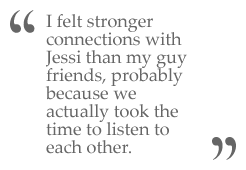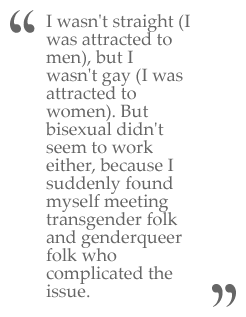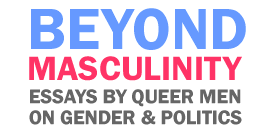|
 While my time spent with men was characterized by
competition, I noticed a completely different
culture among my female friends. Our relationships
were built less around doing things together (or
against each other) and instead about talking. I
remember late nights at parties when Jessi and I
would sit in a bedroom and talk while the rest of
the party was elsewhere in the house playing
Nintendo64, shooting hoops, or playing with fire
(pyromania was a hit among my male friends). Our
conversations during these parties were about
relationships, feelings, and listening. I felt
stronger connections with Jessi than my guy friends,
probably because we actually took the time to listen
to each other. While my time spent with men was characterized by
competition, I noticed a completely different
culture among my female friends. Our relationships
were built less around doing things together (or
against each other) and instead about talking. I
remember late nights at parties when Jessi and I
would sit in a bedroom and talk while the rest of
the party was elsewhere in the house playing
Nintendo64, shooting hoops, or playing with fire
(pyromania was a hit among my male friends). Our
conversations during these parties were about
relationships, feelings, and listening. I felt
stronger connections with Jessi than my guy friends,
probably because we actually took the time to listen
to each other.
Certainly, I don't mean to create a false dichotomy
here; I had guy friends with whom I talked a lot,
and women friends whom I played sports with and
compared strength. And when I did engage in sports
or competition with girls, I still felt like I was
measuring myself not solely as a basketball player
or as a roller hockey player — but also as a man. If
I couldn’t outperform a girl at basketball, say,
then I obviously wasn’t fulfilling my obligation as
a man (to be stronger, faster, and more skilled at
sports than a woman). But, for the most part, my
relationships with guys were different from those
with girls.
And of course, especially against male friends, I
was often less of a man than others: I was skinnier,
slower, clumsier, less athletic, less interested in
cars, and generally less something — and I talked
about women in a different way than most of my male
friends — in that I didn't talk about them hardly at
all (except to say I thought someone was cute or I
had a crush on someone). I was never lewd or crass
about women, like many of my male friends were. I'm
not sure why, but I just felt uncomfortable about
it.
It
wasn't that I wasn't attracted to women. I was and
still am. To this day, I can't figure out why I
didn't want to talk about women the way I heard
other men talking about women. Was it because I was
so uncomfortable hearing my dad talk about women in
that way? If so, why did that make me so
uncomfortable? I wonder sometimes if it was because
I saw women as so much more human than men. Women
expressed themselves, they talked more, they had
feelings, and they demeaned other people less — in
general, at least. Men, on the other hand, treat
each other like crap. Worse yet, I saw them treat
themselves like crap. They never expressed
themselves and kept their emotions all inside,
except maybe for anger. For example, I've never seen
my father cry, not even at my grandmother's funeral.
I've only seen him express two emotions, really:
anger and happiness — and that happiness, of course,
was never too happy, too elated: that would be too
gay.
I
think that it was this difficulty concerning what it
means to be a man, among other factors (growing up
in a small town, not seeing any visibly queer folk,
growing up strictly religious), that prevented me
from coming out until I was 21. Being a man is
defined in terms of relationships to other men and
women. With men, it's competition (who is a better
man); with women, it's a romantic or sexual
relationship. Getting over that hurdle at 21 allowed
me to come out as bisexual when I was 21, but I
wasn't completely comfortable with that term.
 I
wasn't straight (I was attracted to men), but I
wasn't gay (I was attracted to women). But bisexual
didn't seem to work either, because I suddenly found
myself meeting transgender folk and genderqueer folk
who complicated the issue. Once, on a trip to
Chicago, I corrected a five-year-old girl on her use
of pronouns when referring to a rather attractive
person I had just met. “You mean she,” I
said. I was quickly corrected that this person
preferred he or ze (a gender neutral
pronoun). If I was finding people attractive who
didn’t conform to our society’s construction of male
or female, was bisexual the best word for me? I soon
found myself not too comfortable with the gender
dichotomy altogether. I
wasn't straight (I was attracted to men), but I
wasn't gay (I was attracted to women). But bisexual
didn't seem to work either, because I suddenly found
myself meeting transgender folk and genderqueer folk
who complicated the issue. Once, on a trip to
Chicago, I corrected a five-year-old girl on her use
of pronouns when referring to a rather attractive
person I had just met. “You mean she,” I
said. I was quickly corrected that this person
preferred he or ze (a gender neutral
pronoun). If I was finding people attractive who
didn’t conform to our society’s construction of male
or female, was bisexual the best word for me? I soon
found myself not too comfortable with the gender
dichotomy altogether.
And, it turns out, I’m still not comfortable with
the limited options of male and female. When I moved
to Oregon at the age of 24, I first came into
contact with the word queer. I made new
friends who used the word to describe their
sexuality and politics, in part to be more inclusive
of folks who don’t sit within the traditional gender
dichotomy. The word queer hadn’t been
available to me in Iowa, where it seemed like
everyone I met identified as gay, lesbian, straight,
bisexual, or transgender. Now, this “new” term
resonated with me because it connoted strangeness
and confusion, as well as a refusal to sit in a
binary.
I
also became more familiar with feminist theorists
who argue that the root of the oppression of women
lies in the sex/gender system, in the actual
construction of sex and gender itself. It was upon
encountering these theories that I finally felt like
I began to understand what it meant to be a man, as
well as what it meant to be a woman. I had already
understood that gender was socially constructed and
not the same as sex. Additionally, I already felt
that there was something awfully wrong with the way
we constructed manhood, as well as the way men
treated and talked about women in general. However,
it wasn't until reading the work of feminists such
as Catharine MacKinnon, Andrea Dworkin, and John
Stoltenberg that I felt like I had more insights
into our culture's sex/gender system. [2]
|




4 COMMENTS ON THIS ESSAY:
I just finished writing an essay about how wonderful this essay is. It's so modern and amazing. This is the best essay I have ever read. Is there more to read by Michael Faris? I would love to read more of his work.
Beautifully written, concise, and enjoyable to read. Thank you very much for this.
Really beautiful essay. An amazing message on how it would great if people could just accept others for who not what they are. Spot on about the way traditional masculinity is too often expressed by victimizing the 'other'.
I grew up in the south in the 50's and 60's so I know a lot about being picked on and bullied. I knew I was different from everyone else and couldn't understand why I was so disliked, everyone seemed to know but me, I liked more femminine things back then and when I finally opened that closet door when I was 17 it was like a whole new great world opened for me I could look people in the eye, hold my head up and was proud of myself I moved to New york and got in touch with myself and because of my life I had a much more intersesting life than all those small minded bigoted people I left behind I wish I had known someone like you , it would have made growing up a lot easier Just remember hold your head up and be proud of your unique self.